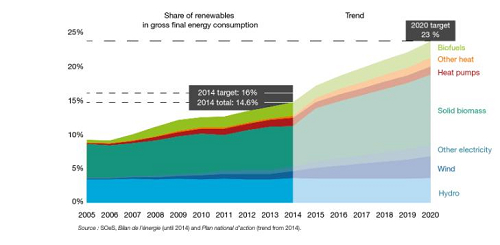France will need further effort to meet environmental goals
France has improved its environmental performance over the last decade, lowering greenhouse gas emissions, reducing some air pollutants and cutting its use of fresh water. Further effort will be needed, however, to reduce pollution by nitrates and pesticides and meet ambitious renewable energy targets, according to a new OECD report.
The Environmental Performance Review of France commends France for its role in brokering the historic climate agreement at COP21 and for its 2015 Energy Transition Law, which sets ambitious targets for further reductions in greenhouse gas emissions, improved energy efficiency, growth in renewable energy and diversified electricity generation.
France’s economy is already one of the lowest in carbon of OECD countries because of the dominance of nuclear power – accounting for 46% of primary energy supply in 2014. Yet as its nuclear plants are ageing, France is falling behind in developing renewable energies. The Review says the country may struggle to achieve its target to raise the share of renewable energy to 23% of gross final energy consumption in 2020 from 14.6% today.
"France must now set out roadmaps for development of different energy sources in order to provide investors with long-term visibility," said OECD Secretary-General Angel Gurría. The commitments made in Paris, such as implementing the Energy Transition Act, must be respected."
The Review recommends that France move quickly to put in place a multiannual energy programme (PPE) planned under the Energy Transition Law. It says the PPE should drive investment in renewable energy by establishing a clear timetable and roadmap for the shift to more renewables, in line with the national low-carbon strategy (SNBC).

"We commend France for having introduced the carbon factor into the taxation of fossil fuels," added Mr Gurría, who nevertheless noted that many exemptions hampered its effectiveness.
The taxation of road fuels is skewed in favour of diesel, a key contributor to air pollution which causes around 21,000 deaths in France every year. The government should accelerate its efforts to align diesel and petrol taxes and abolish tax exemptions that could pose a threat to the environment.
The Review also notes that France is also one of the world’s biggest users of pesticides, which pose risks to health, the environment, biodiversity and ecosystems. Pesticide use increased by 29% in France from 2008 to 2014. The Review recommends France step up research, training and financing to encourage a transition to greener agriculture.
Land use and the fragmentation of natural habitats also threaten biodiversity. The Review welcomes a draft biodiversity law which proposes measures aimed at better integrating biodiversity concerns into planning and policies.
The Review makes 33 recommendations, including that France:
● Adopt and implement a nationwide plan for the reduction of atmospheric pollutants to ensure that upper limits set for the protection of human health are respected.
● Simplify environmental regulations and improve the targeting of inspections.
● Encourage public involvement upstream in the preparation of plans, programmes and projects.
● Carry out a systematic cost-benefit analysis of public investment.
Source: Organization for Economic Co-operation and Development
- 305 reads
Human Rights
Fostering a More Humane World: The 28th Eurasian Economic Summi

Conscience, Hope, and Action: Keys to Global Peace and Sustainability

Ringing FOWPAL’s Peace Bell for the World:Nobel Peace Prize Laureates’ Visions and Actions

Protecting the World’s Cultural Diversity for a Sustainable Future

Puppet Show I International Friendship Day 2020

